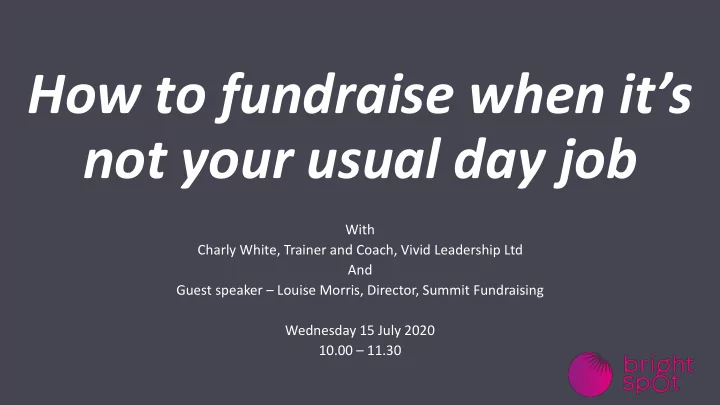

How to fundraise when it’s not your usual day job With Charly White, Trainer and Coach, Vivid Leadership Ltd And Guest speaker – Louise Morris, Director, Summit Fundraising Wednesday 15 July 2020 10.00 – 11.30
What we’ll cover: • What is the impact of COVID-19 on charities and fundraising? • Where should I focus my time? • How do I find the time? • How can I increase my confidence? • Myth busting! • Q & A with Louise Morris, Director, Summit Fundraising
Difficult economic Short staffed and Change in service climate under resourced delivery models Environmental Increased Additional NGOs needed now competition for pressures on staff more than ever funding
Giving trends: There have been some big shifts in donating behaviour. The CAF survey shows that in May 2020: • While cash giving has rapidly declined, web and debit card giving have increased rapidly. • Donations to `Hospitals and hospices’ went up significantly relative to the April average for 2017-19 (41% compared with an average of 21%). • Most donors plan to maintain — or even increase — the amount they donate to charity this year.
Giving trends continued: • Most donors do not plan to shift their giving to different organisations in light of the pandemic; they will stay the course by continuing to support their favourite nonprofits. • Charities must talk about their work in terms of Coronavirus. They must acknowledge what we are all going through, but show how they are mitigating the impact of the virus. • Some people are frightened about the impact on their finances. But others are spending much less on themselves and can afford to give much more • CAF finds that 22% of people say they will likely donate more than they usually do over the next six months in the wake of the outbreak, with 14% saying they’ll likely donate to charity less than usual.
References: • https://www.fidelitycharitable.org/insights/how-covid-19-is-shifting-donor-giving.html • https://www.coronavirusandtheeconomy.com/question/what-are-likely-effects-crisis- charitable-donations • https://www.institute-of-fundraising.org.uk/guidance/coronavirus/round-up-giving-and- fundraising-insight/ • https://www.about-loyalty.com/post/covid-19-sentiment-tracker • https://queerideas.co.uk/2020/04/why-do-people-give-talking-to-donors-during-the- coronavirus-crisis-with-amber-nathan.html
Five things charities should do: 1. Charities need to make themselves visible – show what you are doing. Donors think charities have been quiet. They want to know what you are doing. 2. Charities need to ask for help – if they need it. Not a single donor had felt they had been directly asked to support work to tackle Coronavirus, though younger donors had seen appeals on social media. 3. Charities should give people a chance to show that they are part of the solution – many older people feel they could do more. Giving is a safe and relevant way for them to help. 4. Charities should, where possible, be relevant – show how you are mitigating the impact of the virus. 5. Charities should plan their communications now – Show donors what help is required and – most importantly – show donors what THEY are achieving by giving to you. They want to be part of beating Coronavirus.
Where should I focus my time? • Gather stories that demonstrate need and impact • Reach out to supporters, lapsed supporters, introducers • Learn from BMW! • Be clear on what you're fundraising for • Balance immediate need with long term priorities • Fundraising is everyone’s business • Prioritise staff well-being
How do I find the time? • Eat that frog! • Focus on where there is the greatest need. Be clear about what you’re NOT going to do. • Manage your energy and structure your day accordingly • Focus on your why. Incremental actions amount the big change • Your mindset and beliefs about where supporters fall in your priorities will have the greatest impact
How do I increase my confidence? • Be able to talk authentically about why your cause matters. Align yourself with the need every day • You’re offering an opportunity • Remember, you’re not asking for money. You’re asking if they want to help achieve the outcome. • Seek support from a mentor, colleague, coach
Guest speaker: Louise Morris, Director, Summit Fundraising
Recommend
More recommend